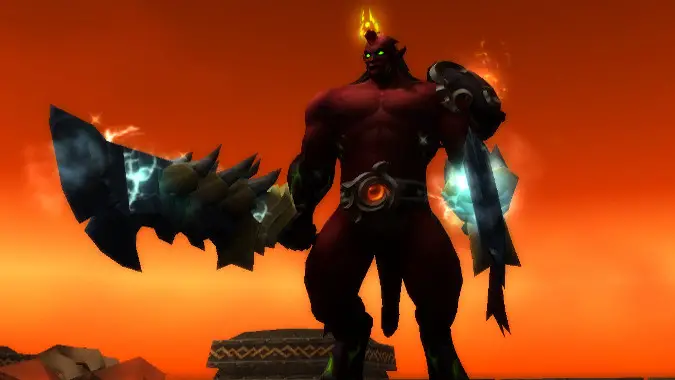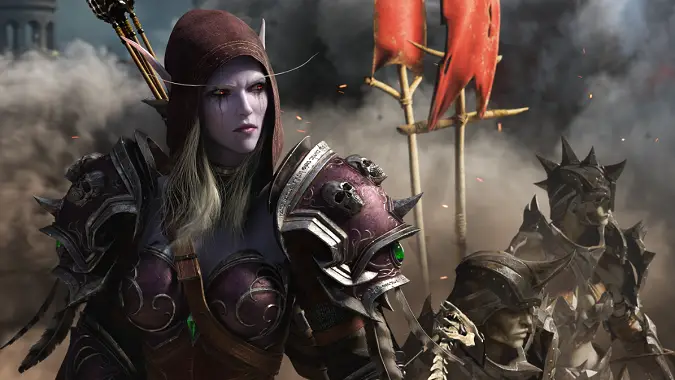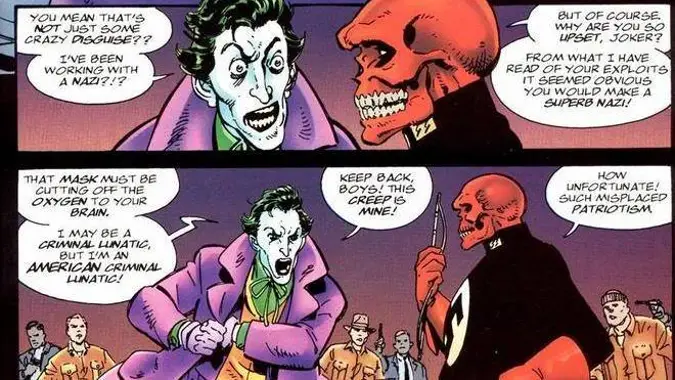How to run an evil campaign in D&D (without having your players resort to murder)

Sooner or later, someone always suggests this one. You’ll be running a game (we’re using D&D here, but it can be pretty much any tabletop game, from Pathfinder to Numenera to Conspiracy X) and one of your players will suggest that everyone play evil characters. Your instinct is to say no, because you tried it that one time and the campaign deteriorated into backstabbing treachery in three sessions. Evil campaigns never work, you might well be saying, and I’m not going to argue that you aren’t supported by a lot of broken campaigns over the years. Players who hear the words ‘we’re playing an evil campaign’ are often tempted to take the governors off and just go for broke, indulging in their every negative impulse.
So while I can absolutely understand why you’d be reluctant, I’m going to talk about how you can run an evil campaign and hopefully keep the destruction and mayhem controllable. I’m not going to say no, never do this, but I am going to talk about the pitfalls and how to avoid or reduce them to make this a game you can run, if you and your players decide to do so.

Make sure everyone is on board
One of the most important things for your game is consent. Consent in gaming has always been there, but often it’s something players and GMs don’t think about consciously. It is important for every kind of game you run, but for a game based around evil characters it’s even more important. If some players go into this expecting a more or less normal game with slightly more NPC murder, while others are reading Machiavelli and preparing their sixteen layer Xanatos gambit plans, you’re going to have upset players and not a fun experience. Make sure everyone understands up front what this is and what it entails, and also, really think carefully about the game and the world you intend to present — then communicate those boundaries with your players openly before you even start rolling the dice.
Using myself as an example, I simply do not want to deal with sexual assault of any kind in my games. Yes, it’s something an evil person might do — I don’t care. I don’t want to run or play in a game where it is happening. This is a personal decision on my part, and if you’re going to run a game where everyone is playing an evil character, you may have to be explicit with your players about what you, as a player or GM, simply can’t tolerate. I’m also not terribly interested in graphic depictions of torture or abuse. I recognize that these kinds of actions happen and I’m okay with them being depicted in a way that doesn’t fling them in people’s faces, but I’m always mindful of my group. What are your players’ boundaries? It’s very important to know this when you’re running a game like this, one where the characters we see the most (the Player Characters, or PCs) are evil.
This is one of those cases where the consent of all the players is extremely important. Without it, the game will not work. It will fall apart and no one will have a good time. Make sure everyone wants to do this, or find something else to do everyone can agree on.

What do you mean by evil?
There’s a comic book written and drawn by John Byrne where Captain America and Batman team up, one of those cross-overs we’ll likely never see in a movie. In this team up, it’s revealed that the Joker is working for the Red Skull, but doesn’t know that the Red Skull is a Nazi, and when he finds out he’s outraged. “I may be a criminal lunatic, but I’m an American criminal lunatic!”
I bring this up because just deciding you’re playing someone evil isn’t the beginning or end of deciding on a character’s personality and ethos. Evil can be a great many things. You can be cruel, sadistic, lacking in empathy, selfish, arrogant… but you don’t have to be all of those things, and just because someone is capable of acts of betrayal, murder, or what have you it doesn’t follow that they’re a walking stereotype who gleefully drowns kittens or engages in every wanton cruelty imaginable. It’s always important to remember that people are complex, with rationales and motivations for what they do — they may believe they have no choice, or that they’re acting for the greater good, or that life is inherently cruel and they have to act first before someone else does it to them.
As a player, playing someone evil doesn’t mean playing Snidley Whiplash. Your character might be patriotic, might sincerely love their family and take the actions they do out of that love, might be honorable and unwilling to break their word or tell lies to get what they want. It’s worth considering your character’s point of view. Why are they even interested in working with a group? What are they after? What are they willing to do to get it, and is there any line they just won’t cross? Remember, Darth Vader is presented as a remorseless killer and the big bad of Star Wars when we first meet him, but his love for his lost children was stronger than his commitment to the Empire, and ultimately brought down Palpatine.
Similarly, one of the things that makes Sylvanas Windrunner so fascinating is that, sure, she does things that are outright horrific, but she isn’t a cartoon — she’s suffered a great deal, been through unimaginably horrible experiences, and is shaped by those experiences. She’d make an amazing PC in a campaign if it was done right.

Remember, you’re here to play a game together
This is one of those things that we call metagaming — making decisions in game based on knowledge your character couldn’t have. In this case, however, I think it’s justified to keep in mind that D&D — or any other RPG — is an exercise in collaboration. It’s equal parts dice rolling and improvisation. If you deliberately go out of your way to make a character who murders orphans and betrays everyone as soon as they can, it won’t last long. It’s worth always keeping that in mind — you are not the only person at the table, and your decisions in game will have an effect on the other players and their characters.
The difficulties of playing ‘evil’ characters are very real, but there can be a catharsis to playing a character who will rationally, intelligently pursue their goals to the exclusion of niceties. One could argue that James Bond, the infamous ‘blunt object’ with a license to kill, is an evil person — he kills without remorse entirely on the say so of his country. He’s an assassin. He’s presented as always opposing others who are far worse than he is, but that doesn’t make him ‘good’ and it also doesn’t make him an uninteresting character.
If a group wants to play characters who are evil, it can actually be an interesting and even fun gameplay experience, but it is very difficult in my experience to keep such a group going indefinitely. It works best as a kind of one shot or limited campaign, a few sessions to let everyone get to know each other before the events of the game are resolved. For that matter, at times, it’s okay for the players in such a game to turn on one another as long as everyone playing understands that this could happen. One of the best episodes of Critical Role is one where everyone is playing as members of a thieves’ guild and at the end they turn on one another, it’s tight and suspenseful entirely because they knew going in what the risks were.
Please never try and force this on your fellow players. Only play an evil campaign with players who want to explore it, and do not try and force this on others — you’ll end up alienating people, and that’s not what any of us play RPGs for.
Please consider supporting our Patreon!
Join the Discussion
Blizzard Watch is a safe space for all readers. By leaving comments on this site you agree to follow our commenting and community guidelines.
 @MatthewWRossi
@MatthewWRossi



